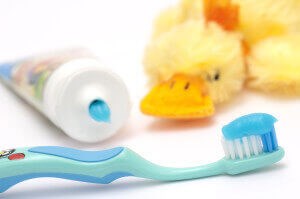
So how are those New Year’s resolutions working out so far? Sadly, by the time late January, early February roll around, many of these best intentions fall by the wayside. Don’t let your smile be one of those abandoned resolutions. Thankfully, many of the steps to a healthier mouth are simple. Your teeth will love you if you keep up with these health habits throughout the year.
Healthy Dental Habits To Adopt In 2018
Don’t just brush–brush properly.
Yes, brushing your teeth is important, but it’s only half of the story. To clean them properly, you have to brush them long enough with the right tools and techniques. The American Dental Association offers these guidelines:
- Brush your teeth twice a day for two minutes. This will ensure you do a thorough job of removing bacteria. If you’ve been indulging in sweets and sticky foods, you should brush your teeth three times a day.
- Use a soft-bristled brush.
- Be sure to change your toothbrush every three months (or sooner if you’ve had a cold).
- Do NOT use a toothbrush with frayed bristles.
- Use fluoride toothpaste that has been accepted by the American Dental Association.
Floss.
Yes, we know. No matter how many times you tell your dentist that next time you’ll be sure to floss, it always ends up falling by the wayside. (Well, at least until the day before your scheduled appointment, when you floss like crazy.) Why do dentists and hygienists put such an emphasis on flossing? Because even the best toothbrush can’t get into the tiny places between teeth. When bacteria accumulate, it turns to plaque, which in transforms into tartar. You may be surprised to learn that it doesn’t matter what time of day you floss, or if you floss before or after you brush your teeth–the most important thing is to do it! Children should floss too! In fact, the American Dental Association recommends that you start flossing your child’s teeth when they have two teeth that are touching. You can help educate your child on the importance of flossing, and by the time they are 10 or 11, they should be able to floss on their own. Flossing should not be painful. Your gums shouldn’t bleed either. The more you floss, the more comfortable it should be. However, if your gums continue to bleed after flossing, speak to your dentist. Bleeding gums can be a symptom of gum disease.
Avoid foods that can damage your teeth.
Sodas, citrus juices and sticky foods can all damage the enamel of your teeth. Sodas, orange juice and other similar drinks have acid that can wear away at your tooth’s protective shell. Sticky foods are hard to remove, and foods high in sugar can feed bacteria, which in turn, set the stage for tooth decay.
Visit your dentist regularly.
Did you know that most dental insurance plans pay for two dental cleanings a year? While you’ll have to check your individual dental policy for specifics, regular cleanings and X-rays are crucial to avoiding more extensive (and expensive), dental treatment later. If going to the dentist makes you nervous, feel free to mention your apprehension. Most dentists will be able to put you at ease. While weight loss and exercise may take the spotlight for the most popular resolutions, don’t forget your teeth. A healthy mouth is an important part of a healthy life.

